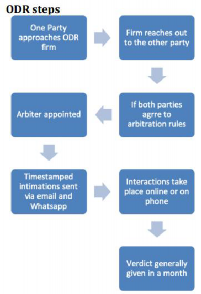5.1. Online Dispute Redressal
In the light of the pandemic-induced lockdown, the Supreme Court recently announced hearings would now take place in urgent matters through video conferencing. Legal experts see this as a spark that could usher in a large-scale infusion of technology in the justice system.
In 2005, an e-Committee established by the Supreme Court for planning the implementation of information and communication technology (ICT) in the judiciary recognised an “urgent need of re-engineering” of the judicial processes and ICT enablement as “mission-critical”. However, a decade and a half later, much of this still remains work-in-progress.

However, Covid-19 has instilled an urgent need for Online Dispute Redressal (ODR) owing to the likelihood of a spurt in disputes before the courts—most notably in lending, credit, property, commerce, and retail.
♤ ODR is the resolution of disputes, particularly small- and medium-value cases, using digital technology and techniques of alternate dispute resolution (ADR), such as negotiation, mediation, and arbitration.
♤ While courts are becoming digitized through the efforts of the judiciary, more effective, scalable, and collaborative mechanisms of containment and resolution are urgently needed. ODR can help resolve disputes efficiently and affordably.
♤ ODR is more suited to complaints that are of low value, high volume and occurring between users with access to internet.
♤ There are two models under ODR
o Opt-in model, in which option of going into mediation is voluntary.
o Opt-out model, under which it is mandatory to enter into mediation for at least one session, and then the parties have the liberty to opt out if they feel so.
ODR mechanisms would assume significance on mainly three fronts:
♤ Dispute resolution: resolving disputes that reach the courts through open, efficient, transparent process. It has the potential to provide expeditious resolution of disputes along with being less expensive, and economical.
♤ Dispute containment: Only those disputes that require judicial resolution should reach the courts. Matters which do not require judicial resolution shouldn't reach the courts at all.
♤ Dispute avoidance: Facilitate and ensure through ODR that a problem does not reach the stage of a dispute. This would ensure a problem does not become a dispute.
